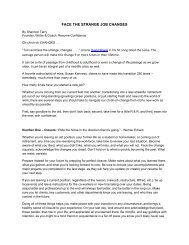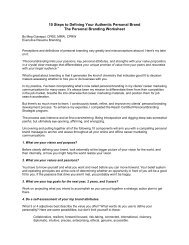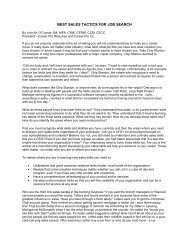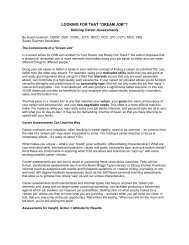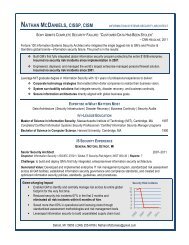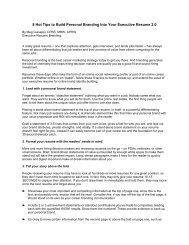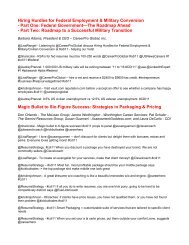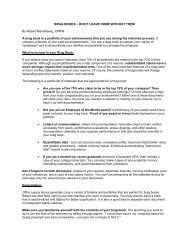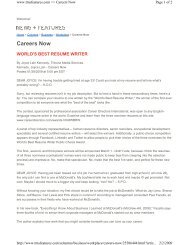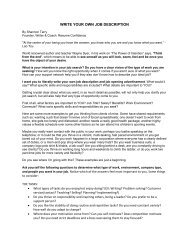NEGOTIATING THE JOB OFFER - Career Directors International
NEGOTIATING THE JOB OFFER - Career Directors International
NEGOTIATING THE JOB OFFER - Career Directors International
Create successful ePaper yourself
Turn your PDF publications into a flip-book with our unique Google optimized e-Paper software.
According to James: "I could have put myself at an advantage in the negotiation process if would have sought out<br />
some academics that I have known over the years who know the inter-workings of this company. James didn't<br />
realize that he could have designed an employment agreement that the company would have signed off on. "So<br />
this means that I lost a good bit over the last two years by not setting the sails right at the beginning," says James.<br />
"I know if I would have completely studied the company and knew my marketability from their perspective I could<br />
have negotiated for more money. It sounds greedy but it's really not." That's the point: jobseekers let emotions<br />
dictate too many of the decisions in their search. If James would have found out how creative he could have been<br />
with the initial offer he could have structured a much more favorable employment agreement. As James says<br />
now: "I just saw this big whopper of an agreement come back, felt like this was a good offer and did not want to<br />
rock the boat."<br />
3. DON'T assume you should wait until the end of the interview process to bring up salary and<br />
compensation issues.<br />
Because many people like James and others do not know their value to a company and don't spend a lot of time<br />
thinking through negotiation issues, they miss out on salary and compensation issue protocol. Know the salary<br />
range of the position. Talk to insiders if you can. Know what questions are appropriate for human resources<br />
personnel to answer. Know what questions and points you can make with the actual hiring manager. Know how to<br />
properly ask your network within the company so that you don't compromise their confidentiality. You may not<br />
have an advantage of knowing someone inside a prospective company but that's okay too. Know that salary and<br />
compensation issues that are tabled up front often delight an employer and recruiter. How you bring these issues<br />
up, your etiquette and listening skills will benefit you greatly to determine your market value and how you can<br />
negotiate in the right salary and compensation elements.<br />
4. DON'T assume the company has an ironclad job description that you either fit or don't fit.<br />
It would surprise most people to find out that almost all elements of the job description may change during the<br />
interview process. At least part of any job advertisement at the senior level must be redesigned or fit to the<br />
individual. Companies don't always exactly know what candidates they'll receive during a search process. There<br />
may be minimum standards but for the right person job descriptions will change to fit the growing needs of the<br />
organization. Knowing this presents a dilemma and an opportunity. The dilemma remains that you may not know<br />
all the elements that are going into hiring. However, the opportunity is for you to ensure that your potential value<br />
to the company is truly valued as early as possible. Innovative companies will be ready to deploy these abilities to<br />
drive revenue and reduce costs. This makes you more valuable and attractive. You may then convince a<br />
prospective employer that these new insights may require or justify a more prosperous offer.<br />
5. DON'T assume that large, typewritten employment agreements with a lot of legal language are not<br />
changeable.<br />
If you were a company wouldn't you create documents that seem impenetrable to most people who are hired? "I<br />
was so exhausted by the interview process," James says. "I just didn't have the energy to counter-offer. Plus the<br />
employment agreement looked unchangeable. It was as it turns out. Many companies expect counter-offers.<br />
Counter-offers don't have to be written in legalize. Counter-offers should be informed, serious documents. A<br />
proper counter-offer is expected by many organizations. Do most people send them? The answer is no. Like<br />
James, most jobseekers think that countering offers may hurt their hiring or make them appear too greedy, too<br />
thankless. Let me state this fact - if you were a company you would probably want people to feel the same way.<br />
Most companies don't encourage or coach you to negotiate your perfect offer. Most casinos don't offer courses on<br />
how to beat or what the odds really are either. You'll find out how good the odds are by checking your pocketbook<br />
at the end of the night. The house wins.<br />
So you say the news is not so bad for James. He's hired, doing well and employed. He would agree. But he did<br />
not find out what his competitive market value was to the company or in the marketplace. He was so exhausted<br />
by the search and interview process he never maximized his potential to design his right offer. It really benefits a<br />
company or organization too. It allows them to design proper offers, deploy talent and skills effectively and retain<br />
the best people.<br />
John M. O'Connor is the President of both divisions of <strong>Career</strong> Pro Inc. (Outplacement Excellence) and <strong>Career</strong> Pro<br />
Resumes. He is available for questions and consultations via phone at (919) 787-2400 or by email at<br />
john@careerproinc.com.



